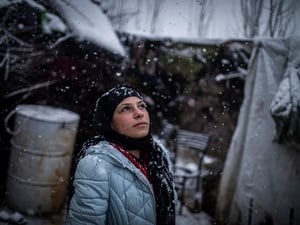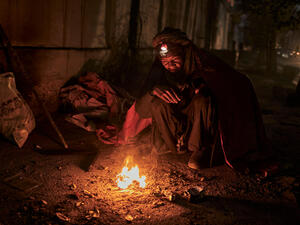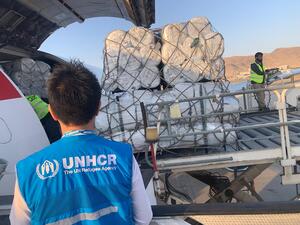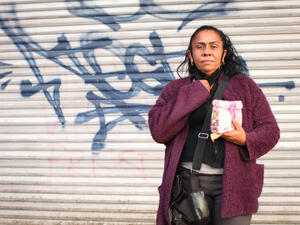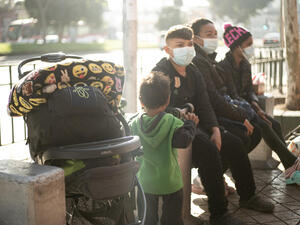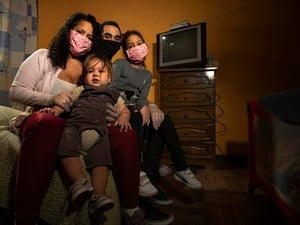As Ukraine conflict heads into fourth winter, thousands face freezing conditions
As Ukraine conflict heads into fourth winter, thousands face freezing conditions

Dinu Lipcanu (left), who heads UNHCR's office in Mariupol, Ukraine, visits local residents whose houses have been damaged by artillery shelling in Avdiivka, Donetsk.
As temperatures plummet across Ukraine, UNHCR, the UN Refugee Agency, is stepping up distributions of aid, including clothing, fuel and cash to the most vulnerable people affected by the conflict in the country’s East.
The aid comprises clothes, warm jackets and boots, coal for heating and cash grants to cover winter expenses. Recipients include some 15,300 people, who are mainly single parents, elderly, families with many children, and people with disabilities or chronic illnesses.
Most have been displaced from their homes in eastern Ukraine by the conflict in the regions of Donetsk and Luhansk, which is now well into its fourth year. Near the line of contact between the government and the non-government controlled areas, houses are frequently damaged by shelling. Several villages have been cut off, because of damaged or degrading infrastructure. Decreased access to transport has made it harder for the people to collect benefits, food and medicine. UNHCR has called all parties to the conflict to protect civilians and critical infrastructure, in full and immediate compliance with international law.
Winter brings additional hardship to the population, as temperatures can plummet to -10oC in December and -20oC in January. Most live in poorly insulated homes and a smaller number in collective centers, and are unable to cover the rising utility costs. In some villages, gas pipes have been damaged by shelling and, as a result, coal and firewood represent the sole means of heating homes. UNHCR staff report that people are often forced to make a choice between buying food and medicines, or fuel to heat their dwellings.
The situation is particularly critical in the non-government controlled areas, where 40 per cent of the households are in need of heating fuel and nearly 90 per cent are in need of winter clothes and insulation. In these areas, UNHCR is providing 9,000 tonnes of coal to 3,000 households and more than 7,500 pieces of winter clothing. UNHCR is also repairing 500 homes to make them suitable for the winter. The limited humanitarian access in those areas, particular for international NGOs, remains a major constraint.
Meanwhile, in government-controlled areas, UNHCR provides unconditional cash grants to 1,000 households, and winter jackets to more than 4,700 children, mostly donated by private companies such as Japan’s UNIQLO.
Movement across the line of contact is also more difficult during the winter months. There are around one million crossings of people across the line of contact each month, to reach family members or get access to services. In winter though, checkpoint operating hours are reduced and heated waiting areas are limited. To address these challenges, UNHCR reinforces existing weather shelters and heated tents at checkpoints or constructs new ones as needed.
In total, the conflict in Eastern Ukraine has led more than 1.5 million people to internal displacement and over 1 million to seek safety outside the country’s borders. UNHCR required $37.6 million to assist them in 2017. Nevertheless, despite funding from donors such as Canada, Estonia, the European Union, Germany, Japan, Sweden, Norway and the USA, UNHCR has only received 35 per cent of the necessary funding to complete its planned activities in 2017.
For more information on this topic, please contact:
- In Kyiv, Hugo Reichenberger, [email protected], +380 50 334 2293
- In Geneva, Aikaterini Kitidi, [email protected], +41 79 580 8334


